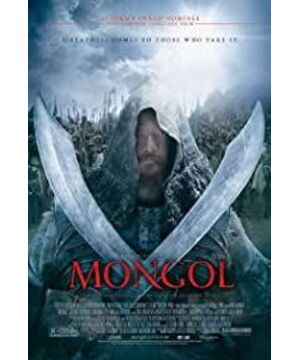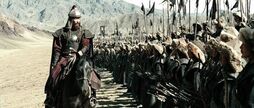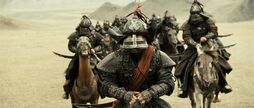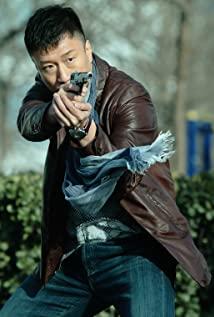The greatness of Genghis Khan lies in the communication of cultural life in the Eurasian continent, although the initial communication was guaranteed by the superb technical tactics and majestic discipline of the cold weapon era. Temujin is an inexhaustible legend for Asians and Europeans alike. Especially the latter, the greatness of wading across most of Europe is admirable. Until now, the history books describing Genghis Khan turned out to be the most detailed and interesting by Europeans. It can be seen that although Temujin, who "only knows how to bend the bow and shoot the eagle", was not in the eyes of Chairman Mao's old man, he still frightened European civilization. The Russians also highly respected Genghis Khan, and the territory of the Yuan Dynasty after Temujin included the present-day Kazakhstan and other countries.
"The Mongol King" accurately reproduces the rough experience of Genghis Khan in his youth, and ends with the young Temujin finally gaining a foothold on the prairie. The bitter and tenacious growth history of Genghis Khan in his youth is full of shame and setbacks. The film has invested a lot of pen and ink to successfully create Temujin's indomitable temperament and the splendid life on the horse of the Mongolian nation. The prairie feelings endorsed by Temujin are truly magnanimous and proud. Even though it is still the life of the nomads on horseback, the reason and etiquette are quite generous and more advanced. The film expresses two regrets in Temujin's life: his father was poisoned by his enemies in front of him, and his new wife was taken away by his opponents for several years.
However, good themes don't come when they should. For some reason, this epic movie was not released until 2007, and it took a full four years before and after. Obviously, "King of Mongolia" must be optimistic about the market prospects of the most popular and popular magic epic "Lord of the Rings" big scene movie four years ago. However, the situation of the film is the same as that of Chen Kaige's "Promise", which took too long and was completely overwhelmed by technological progress. In four years, CGI technology has changed from fresh shock to stereotyped aesthetic fatigue, not to mention a film that started in the early days of special effects. Moreover, the epic narratives that are now being regrouped are suddenly more rhythmically dependent on technology, such as Scott's Kingdom of Heaven. If "King of Mongolia" is released a few years earlier, it is estimated that the effect will definitely be stronger than it is now. Because the technology relied on to show big scenes in the film has long been significantly lower than the current level.
It is a bit reluctant to simply say that "King of Mongolia" lacks entertainment, but the taste of this film is somewhat deviated from the public's usual perception of epic movies. First of all, director Sergei Podlov's shot was relegated to a second-rate movie because of the simplicity of the scene. The majestic atmosphere of epic movies is rare in "The Mongol King", as if the film only explains the character process but is not responsible for the influence of the image. Although the background of the film is a genuine Mongolian prairie, it does not show the magnificence and beauty of the grassland. This is actually one of the most important elements of epic movies that love to inspire people. However, the director blindly made the shots realistically and realistically. Not only for the scenery, but the characters in the images are mostly products of conventional lenses, which lacks enough formalistic entertainment.
Even though "King of Mongolia" is a little shabby in the image, the serious restoration of the real history is not weak at all. The film will be almost the same overall performance of all the experiences of Genghis Khan in his youth, although it is like a BBS documentary with some running account records. But this utter fidelity to the facts has contributed to the film's necessary dramatic conflict. This kind of life experience mixed with Mongolian customs makes it easier for people to believe that Temujin's rough growth and packaging's curiosity about the powerful Mongolians. It's a pity that the director used old-fashioned voiceovers to continue Temujin's growth. This traditional method of dealing with aging is somewhat far-fetched. It cannot reflect Temujin's growth mentality more deeply, and loses a more convincing tone.
Who will play Genghis Khan is a problem, especially for European filmmakers. In our eyes, Genghis Khan is the arrogance of a generation, the suzerain of a dynasty, and an important member of the five thousand years of Chinese civilization. But among Europeans, he is not so simple and great. As the image of a successful invader, Genghis Khan is often a symbol of mystery and brutality, and the miraculous effect produced makes him as mythical and even demonized as Alexander the Great. However, these two vastly different feelings did not affect the great human contribution that Genghis Khan was hailed by later generations to penetrate Eurasia. The Japanese Tadanobu Asano starring in Genghis Khan represents the European aesthetic, not our own choice.
And the director's choice of Asano Tadanobu to play Temujin is just a good or bad choice. Even though Tadanobu Asano's character and ability are unquestionable, they are far from each other just in terms of body shape. The people from the island country are far from the image of the Mongolian Han. Although Asano has been bloated and has relied on makeup, he still looks thin and has a feeling of being out of place. This also includes Sun Honglei, another character actor from China, who only looks like a Mongolian with small eyes and hard flesh on his cheeks. On the contrary, the female characters in the film are very eye-catching, especially Temujin's beloved wife. College student actor Khulan Chuluun is not only convincing in his image, but also has good acting skills, and has appropriately shaped the image of a loyal Puertie. The roles chosen by the director are actually first-class character actors, so although they are a little confusing in terms of perception, their acting skills are still very good, especially the eyes like Asano's beasts and Sun Honglei's signature bold and cunning memory.
I heard that "King of Mongolia" is only the first part of Genghis Khan's trilogy, and there will be a generation of geniuses in middle age and old age. If director Sergey Podlov could summarize the gaps and advantages of the first work: to produce the style of an epic movie and the entertainment necessary for the times, and still maintain a high degree of historical authenticity, this set of films is still full of expectations.
View more about Mongol: The Rise of Genghis Khan reviews








